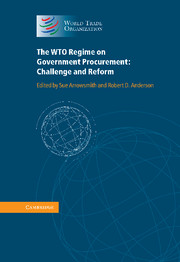Book contents
- Frontmatter
- Contents
- List of contributors
- Foreword by Pascal Lamy
- Perspective of the Chairman of the WTO Committee on Government Procurement, Nicholas Niggli (Switzerland)
- Preface
- Disclaimer
- PART I The WTO regime on government procurement
- PART II Expanding the scope of the Agreement on Government Procurement: accession and coverage
- PART III Revision of the procedural rules and other transparency provisions of the Agreement on Government Procurement
- PART IV Developing countries in the WTO procurement regime
- PART V Economic and social development (horizontal policies) in government procurement
- PART VI Enforcement and remedies
- PART VII Multilateralism and regionalism
- PART VIII Challenges and new directions
- 22 Ensuring integrity and competition in public procurement markets: a dual challenge for good governance
- 23 Developing multilateral rules on government procurement: the value of soft law
- 24 Work of UNCITRAL on government procurement: purpose, objectives and complementarity with the work of the WTO
- 25 Global procurement law in times of crisis: new Buy American policies and options in the WTO legal system
- 26 Procurement in times of crisis: lessons from US government procurement in three episodes of ‘crisis’ in the twenty-first century
- Index
- References
24 - Work of UNCITRAL on government procurement: purpose, objectives and complementarity with the work of the WTO
from PART VIII - Challenges and new directions
Published online by Cambridge University Press: 07 September 2011
- Frontmatter
- Contents
- List of contributors
- Foreword by Pascal Lamy
- Perspective of the Chairman of the WTO Committee on Government Procurement, Nicholas Niggli (Switzerland)
- Preface
- Disclaimer
- PART I The WTO regime on government procurement
- PART II Expanding the scope of the Agreement on Government Procurement: accession and coverage
- PART III Revision of the procedural rules and other transparency provisions of the Agreement on Government Procurement
- PART IV Developing countries in the WTO procurement regime
- PART V Economic and social development (horizontal policies) in government procurement
- PART VI Enforcement and remedies
- PART VII Multilateralism and regionalism
- PART VIII Challenges and new directions
- 22 Ensuring integrity and competition in public procurement markets: a dual challenge for good governance
- 23 Developing multilateral rules on government procurement: the value of soft law
- 24 Work of UNCITRAL on government procurement: purpose, objectives and complementarity with the work of the WTO
- 25 Global procurement law in times of crisis: new Buy American policies and options in the WTO legal system
- 26 Procurement in times of crisis: lessons from US government procurement in three episodes of ‘crisis’ in the twenty-first century
- Index
- References
Summary
Introduction
The United Nations Commission on International Trade Law (‘UNCITRAL’) is the main legal body of the United Nations system in the field of international trade law, with a general mandate to further the progressive harmonization and unification of the law of international trade, through the issuing of conventions and model laws, cooperation with other international organizations and technical assistance.
Although both UNCITRAL and the WTO have mandates addressing the rules governing international trade, their scope is rather different. The WTO addresses state-to-state relations, whereas UNCITRAL's texts relate mainly to private law commercial transactions (including tangential aspects of administrative or constitutional law) in individual states. As regards procurement, the GPA addresses the harmonization of procurement law with the express aim of opening up markets to international competition by preventing Parties from discriminating against suppliers from other Parties, and applying rules of transparency and open competition in procurement. UNCITRAL seeks to facilitate international trade through the harmonization of national law on procurement based on the main principles of transparency and competition (but it is arguably less demanding as regards international competition and more flexible on the protection of national suppliers). This chapter will examine the similarities between the texts, reflecting that the principles underlying good procurement practice are fundamental to both of them, and concluding that the texts are largely consistent for good reason: there is no reason to follow different approaches whether the primary aim is trade liberalization or achieving best value for money in national procurement.
- Type
- Chapter
- Information
- The WTO Regime on Government ProcurementChallenge and Reform, pp. 746 - 772Publisher: Cambridge University PressPrint publication year: 2011
References
- 4
- Cited by



